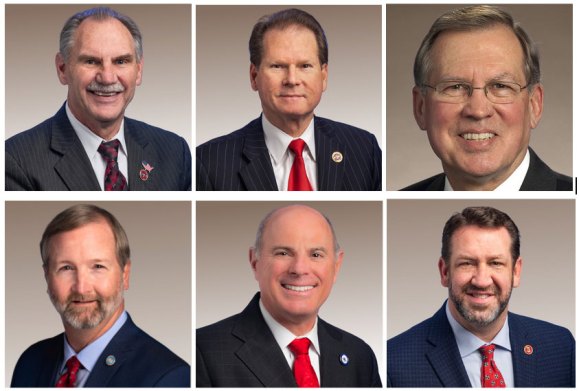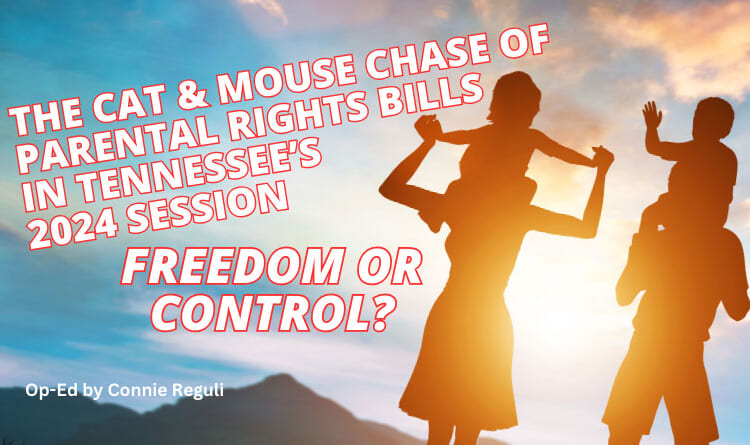Image Credit: Canva
By Connie Reguli, J.D. (Family Policy Specialist and Activist) –
For parental rights aficionados, Tennessee’s current cat and mouse game over three separate parental/family rights bills is dizzying. And if you are an unsuspecting-easily-excited layman who still believes legislative headliners, this appears to be bait and switch tactic which is now seemingly normal for Tennessee state lawmakers.
We have three separate bills moving through committees and each one has its own trickery. So let’s see if these bills are really parental rights or if they are a slight-of-hand government grab over of the constitutionally protected liberty right to parent our children already secured with at least fifty years of case law from the highest court in the land.
First is HB1414/SB0620 (Todd R-Madison County/Pody R-Lebanon). This was the first bill to be introduced in the first session on January 26, 2023, this bill mimics the model legislation promoted by ALEC (American Legislative Exchange Council) which is the guidestone for Republican state legislators.
This bill seems to have no momentum and in fact, just fell off the proverbial legislative cliff stalling in the House on February 7, 2023. Pody’s Senate bill is now set for the Senate Judiciary committee for February 27, 2024.
The second bill HB1913/SB1873 (Bulso R-Brentwood/Hensley R-Hohenwald) popped up in January 2024. It was on the calendar in the Children and Family Affairs subcommittee for February 6, and then February 20, and is now pushed to March 5. Hensley’s Senate bill is set in Senate Judiciary committee for February 27, 2024.
That brings us to the third bill HB2936 /SB2759 (Faison R-Cosby/ Haile R-Gallatin) was filed in January 2024. The House bill has not yet been calendared. The Senate bill was on the Senate Judiciary calendar for February 20, 2024 and was passed to February 27, 2024.
For convenience, we will call them Todd/Pody (SB0620), Bulso/Hensley (SB1873), and Faison/Haile (SB2759).
Let’s just look at the obvious differences from first glance. Todd/Pody’s bill is nine pages. Faison/Haile’s bill is eight pages. And Bulso/Hensley’s bill is four pages. In spite of the fact that they all start with similar language, the page difference is enough to let the reader know that closer scrutiny is required.
First difference: Bulso/Hensley’s bill amends the Tennessee Code at Title 36, Chap 2. Chap. 2 which is the parentage chapter, primarily dealing with out of wedlock birth, putative fathers and the such. The other two bills create a whole new chapter under Title 36, referred to as Chap. 8. A new chapter makes more sense. Well maybe.
Bulso/Hensley’s four page bill (the Chap.2 bill) has two other striking differences.
The first distinction is the odd treatment of the language “fundamental right”. Todd/Pody and Faison/Haile include this language in the first page and Bulson/Hensley buried this language in section 105 (at the end of the bill) as a seeming afterthought.
All three bills do this: Enumerate what rights are parents rights and provide exceptions to parental rights giving the judicial, legislative and executive branches the right to limit those rights.
All of the bills say that these fundamental parent rights should not be burdened or interfered with by the government “unless the government entity demonstrates that the burden is required by a compelling governmental interest of the highest order and is the least restrictive means of furthering that compelling governmental interest.”
So what might be, “a compelling governmental interest of the highest order”?
This legal language is tossed around in several federal cases in which the government is constantly trying to undermine the personal freedoms described in the Bill of Rights.
For instance, the U.S. Supreme Court discussed this legal standard in protecting the First Amendment Right of freedom of religion. “The Court will not permit encroachments upon this liberty, whether direct or indirect, unless required by clear and compelling governmental interests ‘of the highest order.’” Emp’t Div. v. Smith, 494 U.S. 872, 895 (1990)
But, here’s the deal. We already have fundamental parental rights, and we already have the protection against government encroachment unless this high legal standard of “strict scrutiny” is met.
Here is what it looks like:
It is well established by these Courts that parents have fundamental interest to parent their children. The state may not interfere in child rearing decisions when a fit parent is available. Troxel v. Granville, 530 U.S. 57 (2000), Prince v. Massachusetts, 321 U.S. 158 (1944), Pierce v. Society of Sisters, 268 U.S. 510 (1925), Meyer v. Nebraska, 262 U.S. 390 (1923). A child also has a constitutionally protected interest in the companionship and society of his or her parents. Ward v. San Jose, 967 F. 2d 280 (9th Cir. 1992) A state employee who withholds a child from her family may infringe on the family’s liberty of familial association. Murphy v. Morgan 914 F. 2d 846 (7th Cir. 1990) The forced separation of parent from child, even for a short time; represent a serious infringement upon the rights of both. J.B. v. Washington County, 127 F. 3d 919 (10th Cir. 1997) Absent extraordinary circumstances, a parent has a liberty interest in familial association and privacy that cannot be violated without adequate pre-deprivation procedures. Malik v. Arapahoe Cty. Dept. of Social Services 91 F. 3d 1306 (10th Cir. 1999) Parent’s interest is of “the highest order,” and the court recognizes “the vital importance of curbing overzealous suspicion and intervention on the part of healthcare professionals and government officials. Thomason v. Scan Volunteer Services, Inc. 787 F. 2d 403 (8th Cir. 1996)
When viewed behind the historic opinions that protect parental rights, the language in these bills contain a lot of “what ifs” that will allow the legislative, executive, and judicial branches of the Tennessee government to start carving them away.
The Bulso/Hensley bill says that the parent has the right to make decisions on the health, mental health, well-being, or health care of the child “unless otherwise prohibited by law.” The right to review all medical records “unless prohibited by law” or “if the parent is the subject of an investigation of a crime.” The bill also provides that a parent must give written consent for a video or voice recording of a child “unless the recording is made” as part of a criminal or department of children’s services investigation. And, the right to be notified if a criminal offense has been committed against your child or any other government entity “unless the incident has first been report to law enforcement or the department of children’s services”. The Bulso/Hensley bill, the shortest of the bills with only four pages, provides the greatest government power to except the rights of parents by future legislative actions or executive orders.
The Todd/Pody bill and the Faison/Haile bill have removed the “unless otherwise prohibited by law” language from medical and mental health decision making. They also remove the restrictive language which would prohibit access to medical records. However, they still allow for secret forensic interviews of children without parental knowledge or consent. Of course, a child victim of abuse needs to be part of an investigation, but if you know how routinely children’s services go to public schools and privately interview children without the parent’s knowledge you would understand that the express consent to do so in the bill is unacceptable. Interviewing children can be done properly with witnesses, therapists, or non offending family members.
The Todd/Pody bill prohibits the collection of a child’s DNA “unless authorized pursuant to a court order.”
The Faison/Haile and Todd/Pody bills include a couple of bonuses. First, it states that a public employee, other than law enforcement (oops, another intrusion), cannot encourage or coerce a child to withhold information from the child’s parent and the public employee shall not withhold information from the parent that is relevant to the child’s physical, emotional, or mental health. So, law enforcement CAN coerce a child?….okay.
The second bonus in the bills is the right of a civil action for a violation of the enumerated parental rights stating that a parent whose rights have been burdened by a government entity in violation of this section may assert the violation as a claim or defense in any judicial or administrative proceeding. A parent who prevails may recover injunctive relief, monetary damages, and attorney’s fees. This right to a civil action is duplicated in the section of the bill describing parental rights to consent and control of the medical and mental health of the child.
The Todd/Pody bill specifically waives all sovereign, government, and qualified immunities for civil liability.
BUT, the Faison/Haile bill twice undermines fundamental parental authority when it comes to medical and mental health treatment. The bill says “if a child has no affirmative right of access to a particular surgical, medical, or mental health procedure or service, then this act does not grant the child’s parent an affirmative right of access to that procedure on that child’s behalf.” (Sec. 38-8-104) And a similar governmental limitation is tagged regarding medical and mental health treatment when the words “except as otherwise provided by law or court order”. (Sec. 63-6-249)
The Todd/Pody bill includes a specific section for educational involvement of parents which is not included in the Bulso/Hensley or Faison/Haile bills. This section provides for parent participation in the course of study, the right to withdraw a child from harmful curriculum, the duty of the school to get parental consent before providing gender and sex education, and the requirement of parental consent before changing a child’s name or pronouns while at school.
For those following the transgender news, it is easy to see that the Faison/Haile bill is trying to prevent any further litigation over the state’s restrictions on gender transitioning of children. The Sixth Circuit upheld the new restrictions in Tennessee and Kentucky in September 2023 stating that the government could set restrictions on what children might be subjected to, however, the dissenting opinion was all about the fundamental parental right to make medical decisions for our children. L.W. et al. v. Skermetti, No. 23-5600, Sixth Circuit.
The Todd/Pody bill is aimed at staunchly opposing the gender transition narrative popping up across the country. In Montana, a child was removed from his father and stepmother when they refused to use his preferred pronouns. In Indiana, another family lost their child to state’s custody when they refused to use the pronouns and name preferred by the child which conflicted with their biological sex. In Texas, another father lost custody rights to the mother when the father refused to consent to gender transitioning therapies. All three of these states are dominated by Republican state politicians and lawmakers.
This article may provide you with more confusion than enlightenment about the differences and distinctions in these three pieces of legislation. It took a deep dive to sort out the differences and it is unlikely that any of our state legislators will do the same, unless we are lucky enough for them to read this article.
Email your thoughts and remarks to these legislators and perhaps the best recommendation is to pull all three bills until there is a consensus on what parental rights must be legislated and how we do it.
In the meantime, it’s best to call it quits on these three bills.

Senator Mark Pody (R-Lebanon) sen.mark.pody@capitol.tn.gov
Senator Joey Hensley (R-Hohenwald) sen.joey.hensley@capitol.tn.gov
Senator Ferrell Haile (R-Gallatin) sen.ferrell.haile@capitol.tn.gov
Rep. Chris Todd (R-Madison) rep.chris.todd@capitol.tn.gov
Rep. Gina Bulso (R-Brentwood) rep.gino.bulso@capitol.tn.gov
Rep. Jeremy Faison (R-Cosby) rep.jeremy.faison@capitol.tn.gov
About the Author: Connie Reguli, J.D. has a law degree and worked the trenches of the legal landmines in Tennessee for three decades traveling for half of Tennessee’s 95 counties. She has worked over 40 appeals in the state courts; she is responsible for two significant Tenn. Sup. Ct. developments, and she has carved out civil rights for families and children in the Sixth Circuit. Her area of emphasis is the integrity of the family unit, the perverted federal funding behind programs that affect the family, and abolishing the current child welfare system. She wears the battle scars from fighting for liberties in the Tennessee courts, but wants to share her knowledge and analysis with other God-fearing conservatives. She can be found on Facebook, TikTok, Instagram, X, and YouTube.



